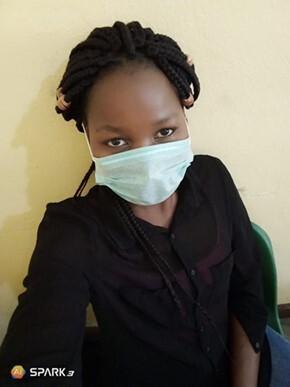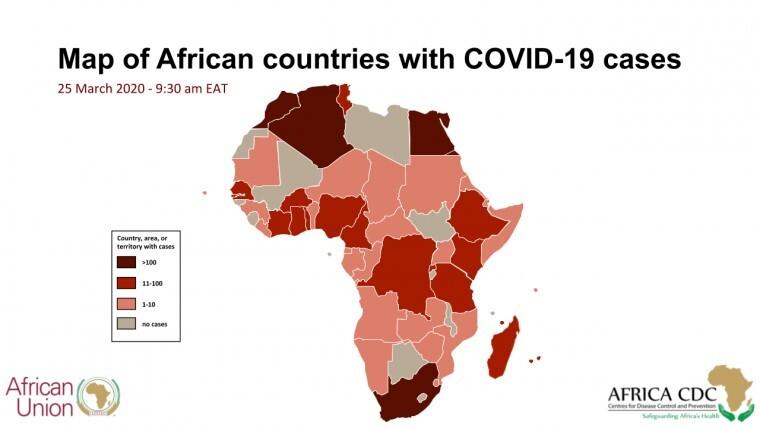Ghana: Quick to act
Ghana was quick to respond to the situation, closing borders, calling for self-quarantine and requesting emergency credit help from the International Monetary Fund. There are currently 54 cases and 2 people have died. The country has already closed its borders and the tourism authority has also shut all beaches indefinitely to contain the spread of the disease.
Kuapa Kokoo closed their office and all field activities on the 19th March until at least the 2nd April, when the situation will be reviewed. Some Kuapa Kokoo staff are working from home, including our partner Agyemang Prempeh who leads on the PS&D labour rights project. He is working from home whilst also studying for his law degree.
Sierra Leone: The experience from Ebola is framing how the country reacts
Sierra Leone is a country scarred from the Ebola crisis. Even when I visited in February, our partner refused to hug me as I got off the ferry after my flight. He said they were scared. Whilst Sierra Leone has no confirmed cases yet, the government is taking no chances and has already taken significant precautionary measures, including on 24th March declaring a 12-month state of Public Health emergency. Sierra Leone was one of three countries at the epicentre of the Ebola epidemic that began in 2014 and killed more than 11,000 people in West Africa. The nation’s $4.1 billion economy is still struggling to recover from the effects of that outbreak.
A week ago, the government of Sierra Leone announced travel restrictions and enforced quarantine on travellers from high-risk countries such as the UK, prompting the FCO to advise against all but essential travel to Sierra Leone. those countries.
Restaurants and cafes have been shut down in the capital Freetown, as well as in other places, and washing stations have been erected for people to wash their hands. Schools will be shut on the 31st March, and the government has banned gatherings over 100 people.
Soldiers have been sent to the Liberian border, as people are still travelling through this border and there are cases of Coronavirus in Liberia. The Gola Rainforest crosses this border, and farmers of Ngoleagorbu Cocoa Farmers’ Union live in Forest-Edge Communities close to the border with Liberia, so there is some concern.
However, in Kenema which is a cocoa selling hub on the edge of the Gola Rainforest, and where the Ngoleagorbu warehouse is based, trade is still happening. There is a strong presence of Lebanese cocoa traders in the area who have a lot of power, and reports are that they are still very much active. Our partners have shared that work is going on as normal and field visits are allowed, however there are tight hygiene practices in place, and when people enter a new community they must report to the authorities.
They said: “we are scared and praying that Coronavirus doesn’t come to Sierra Leone as we never want to see scenes like we did before”.
São Tomé: No cases so far but a bad week for the women’s football team
Our partners say that schools are closed and many business and shops have too, but CECAQ-11 are continuing to work. The main news coming out of São Tomé in relation to the virus is that the national girls’ U-17 football team are currently stuck in Cameroon because of COVID-19 after a 10-0 defeat in a qualifier for the Fifa U-17 women's cup. See BBC news article here: The worst week? Sao Tome's women's U17 team stuck in Cameroon - after 10-0 defeat
Malawi: Information trickling down slowly and farmers worried for their lives
Nduzani who visited the UK just a few weeks ago during Fairtrade Fortnight has sent an update. She is a teacher, and she said schools have been closed but she is still going to work to mark exams that happened before the school closures. From next week, the teachers at her school (an Academy) are going to start teaching online, or recording videos that they will send out to parents. However lower income families who do not attend schools like this or have access to the necessary technology, will not be able to do this. Nduzani said that all meetings of more than 100 people have been banned, including political meetings, conferences and religious gatherings. She also said there are buckets of water or hand sanitiser everywhere you go and in shops before you enter, and people are wearing masks and are feeling scared.
She told the Divine team to “Stay safe and well and wash our hands every 5 minutes!”.

Jonty Williams, General Manager of Kasinthula has shared that whilst there are no cases yet in Malawi, farmers are concerned and have been asking him about Coronavirus and if they would die from it. Kasinthula as an organisation has already instigated discussions, distributed leaflets and installed hand washing facilities.
Jonty’s family is in the UK, and he has just left Malawi as advised by the UK government. He is currently on the last flight to Nairobi before the airport closes at midnight on 25th March. Charles Chavi, Administrator for the Shire Valley Cane Growers’ Trust will now be leading operations.
Latest update on cases as of 08/04/2020:
Ghana: 287 cases
Sierra Leone: 7 cases
Malawi: 8 cases (Interestingly Malawi's president and all government ministers are taking a 10% wage cut for three months to raise money to tackle the coronavirus outbreak: https://www.bbc.co.uk/news/world-africa-52172164)
São Tomé and Principe: 4 cases



